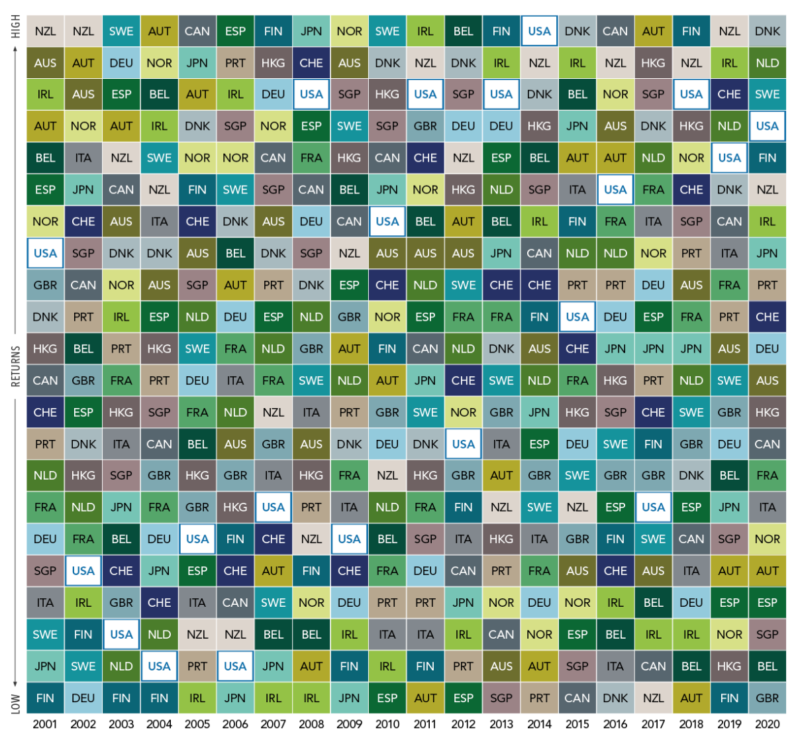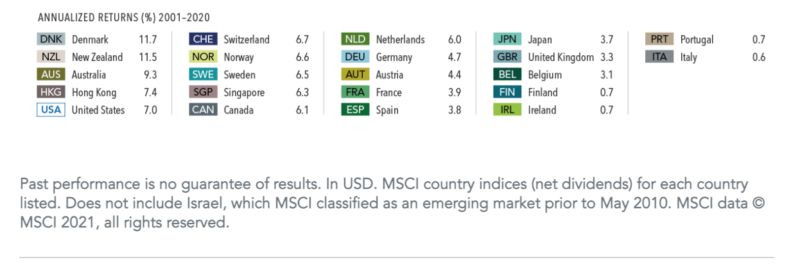
We often read in the financial pages that such-and-such a country is due for a good run, or that another country is heading for a spell in the doldrums. But does it make sense to tweak your portfolio periodically, depending on the economic prospects for different countries? As this article by DIMENSIONAL FUND ADVISORS explains, the answer is no: a globally diversified portfolio can help provide more reliable outcomes over time.
Investment opportunities exist all around the globe, but the randomness of global stock returns makes it exceedingly difficult to figure out which markets are likely to be outperformers. How should investors deal with this kind of uncertainty?
First, they should remember that it’s challenging, at best, to predict a country’s returns by looking at the past, as shown by the performance of global markets since 2001 (see the chart below). In the past 20 years, annual returns in 22 developed markets varied widely from year to year. (Each colour represents a different country, and each column is sorted top down, from the highest-performing country to the lowest.)


Two examples help make the point well:
• Austria posted the highest developed markets return in 2017 — but the lowest the next year.
• The US ranked in the top five for annualised returns over the entire 20 years but finished first in the country rankings just once over that period. In nine calendar years, it was in the lower half of performers.
Investors can benefit from understanding that they don’t need to predict which countries will deliver the best returns during the next quarter, next year, or next five years. Why? Holding equities from markets around the world — as opposed to those of a few countries or just one — positions investors to potentially capture higher returns where they appear, and outperformance in one market can help offset lower returns elsewhere. Put another way, a globally diversified portfolio can help provide more reliable outcomes over time.
This article first appeared on the Dimensional Fund Advisors blog, Dimensional Perspectives.
MORE FROM DIMENSIONAL
David Booth on 50 years of indexing
Stressing about rising inflation achieves nothing
Ken French on the danger of false positives
Booth and Fama on rising inflation
Are YOLO traders undermining efficient markets?
Should a top-heavy stock market worry us?
DISCLOSURES
Diversification neither assures a profit nor guarantees against loss in a declining market.
The information in this document is provided in good faith without any warranty and is intended for the recipient’s background information only. It does not constitute investment advice, recommendation, or an offer of any services or products for sale and is not intended to provide a sufficient basis on which to make an investment decision. It is the responsibility of any persons wishing to make a purchase to inform themselves of and observe all applicable laws and regulations. Unauthorized copying, reproducing, duplicating, or transmitting of this document are strictly prohibited. Dimensional accepts no responsibility for loss arising from the use of the information contained herein.
Investments involve risks. The investment return and principal value of an investment may fluctuate so that an investor’s shares, when redeemed, may be worth more or less than their original value. Past performance is not a guarantee of future results. There is no guarantee strategies will be successful.









